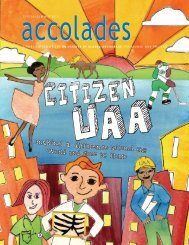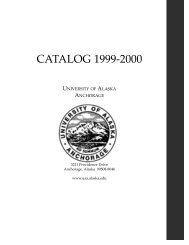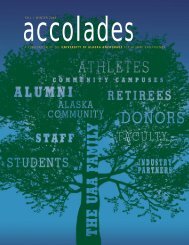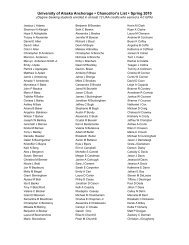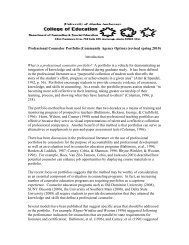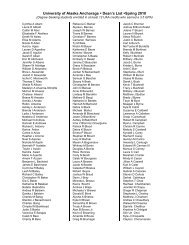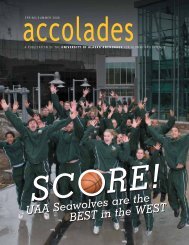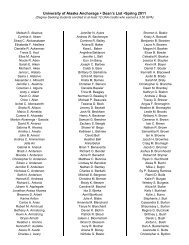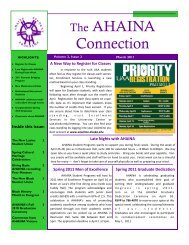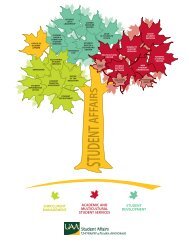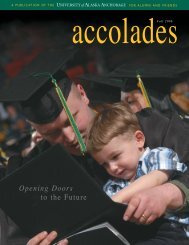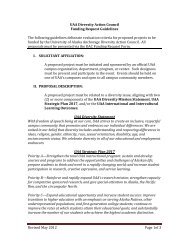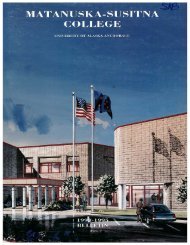UNIVERSITY OF ALASKA ANCHORAGE
UNIVERSITY OF ALASKA ANCHORAGE
UNIVERSITY OF ALASKA ANCHORAGE
You also want an ePaper? Increase the reach of your titles
YUMPU automatically turns print PDFs into web optimized ePapers that Google loves.
P R O G R E S S I V E P R O G R A M S<br />
There’s no debating<br />
a winning tradition<br />
UAA debaters flourish in<br />
World Championship environment<br />
Fresh from success at World<br />
Championships, UAA debate team<br />
looks to the future, unwilling to<br />
rest on laurels<br />
F<br />
or UAA communications associate professor<br />
and coach Steve Johnson’s internationally<br />
renowned debate team even a “New York<br />
minute” seems long enough to make a point.<br />
Just ask debaters from Harvard,Yale, Oxford,<br />
Cambridge, MIT, and an array of other<br />
prestigious colleges and universities that have felt<br />
the pressure applied by a well-turned phrase or<br />
the helpless realization that their UAA<br />
opponent is simply a quicker study. There’s just<br />
no debating success.<br />
When asked how a team from remote Alaska<br />
can produce such winning tradition on the world<br />
stage, Johnson says,“UAA has an award-winning<br />
debate team. UAF has a nationally competitive<br />
rifle team. It comes as no surprise to me that<br />
Alaskans excel in arguing and shooting.”<br />
For more than 10 years, orators from<br />
tradition rich, well-endowed schools, have<br />
learned the hard way how talented and focused<br />
Seawolf debaters can be under Johnson’s<br />
leadership. A parliamentary debate national<br />
championship in 2002 and continued success at<br />
world and national<br />
competitions have elevated the program to a<br />
level of prominence far exceeding expectation<br />
when it began in 1982.<br />
Once a “drifting” college freshman himself,<br />
Johnson discovered the joy of intellectual<br />
challenge in debate and turned it into a life-long<br />
passion. “I knew the moment I stepped on stage<br />
and faced the audience in my first debate that I’d<br />
found my life’s work,” he recalls.<br />
Determined to share his passion, he has<br />
taken an upstart program to the upper echelons<br />
of intercollegiate debate, but not without sacrifice<br />
and perseverance. Funding is always on his<br />
mind. But contributions from university alumni<br />
and the community, along with support from the<br />
university, help provide the resources necessary<br />
for fielding a team at a world-class level.<br />
It’s all about being resourceful. The team for<br />
example, well in advance of competition,<br />
prepares and reviews volumes of material related<br />
to current events, world politics, controversial<br />
issues, matters of public policy, and ongoing<br />
philosophical debate, from which a “for and<br />
From left: Chris Kolerok, Rose Helens-Hart, Steve Johnson<br />
(Head Coach), Lindsay Eberhardt, Adriel Mathew, Hilary Seeger,<br />
Chanille Lewis (Assistant Coach), Dana Ovsak, and Tom Lassen.<br />
against” perspective is derived. Debaters must<br />
be prepared to present arguments on both<br />
sides of an issue.<br />
At this year’s world competition, two of the<br />
compelling topics of debate were whether a<br />
legally-enforceable right to a minimum<br />
standard of living should be recognized and<br />
whether Japan should be given a permanent seat<br />
on the UN Security Council.<br />
“Our student competitors are very well<br />
versed on a myriad of topics and have spent<br />
many hours working issues from all<br />
perspectives” the coach adds. “In competition,<br />
once one of our teams is given a topic and<br />
perspective for debate we refine our thinking<br />
and hone-in on the elements of a logical position<br />
and presentation.”<br />
In recruiting debaters or identifying<br />
prospects it is glaringly obvious when someone<br />
has what it takes to be great. Not unlike<br />
athletics, music, or theater – talent is talent.<br />
Johnson’s job is to help refine it, channel it, and<br />
mold it in a team environment.<br />
“We have just 15 minutes to prepare once a topic has been announced and only 14 minutes<br />
to articulate our position.Talk about pressure. UAA’s four two-member teams thrive on it.”<br />
The key for the individual is focus. But it<br />
helps when a competitor is knowledgable about<br />
a topic, can validate a position, exudes confidence,<br />
loves to argue and is expecting the audience to<br />
hang on every word. Is it a performance?<br />
Certainly, but with substance, the coach feels.<br />
“It’s all about matter and manner,” Johnson<br />
says. “At some point you may realize that your<br />
opponent has an equally compelling and valid<br />
argument and then it becomes about<br />
strategy and tactics.”<br />
In parliamentary debate, each speaker has<br />
seven minutes, the first and last of which are<br />
protected. During the middle five minutes,<br />
positions are subject to challenge, question, and<br />
interruption from the other teams in the round.<br />
The presenting competitor must decide whether<br />
to acknowledge a challenge or ignore it, making a<br />
team strategy essential.<br />
“An opponent’s challenge often presents an<br />
opportunity to emphasize your own position and<br />
we work hard on identifying those situations,”<br />
Johnson explains.<br />
The UAA faculty-run debate program<br />
periodically displays its competitive prowess on<br />
campus debating issues of public policy and by<br />
hosting local high school competitions.<br />
Johnson believes that this type of exposure is<br />
essential in identifying future Seawolf debaters.<br />
The team will also host the inaugural Cabin<br />
Fever Debates intramural competition this<br />
Spring semester in an effort to promote the art<br />
of debate and enable all UAA students the<br />
opportunity to compete for prizes and slots in<br />
the U.S. Universities Debating Championship.<br />
A member of the National Parliamentary<br />
Debate Association (NPDA), the nation’s largest<br />
intercollegiate debate organization, UAA not<br />
only excels as a team, but has produced two<br />
national rookies of the year.<br />
While the country typically witnesses the<br />
staged folly of candidate debates during<br />
presidential campaigns, it’s not everyday we’re<br />
exposed to well thought-out discussion of<br />
important issues by a group of bright, articulate,<br />
albeit somewhat animated and very opinionated<br />
young people in a public forum. Unless, of<br />
course, you’re Steve Johnson who knows better<br />
than most how fortunate UAA is to field a<br />
debate team that provides a voice for one of the<br />
state’s greatest resources, today’s Alaska<br />
college student.<br />
You could make the argument that<br />
spending the winter holiday break in Ireland<br />
discussing issues of international significance<br />
and profound ideology was worth the trip.<br />
That is, if you’re a member of the highly<br />
touted UAA debate team which returned<br />
from Dublin after competing in the World<br />
Universities Debating Championship where<br />
it finished in the top third of 233 teams from<br />
29 countries, including Russia, South Africa,<br />
China, Malaysia, Indonesia, and Bangladesh.<br />
The eight-day tournament featured more<br />
than 740 one-hour debates at University<br />
College Dublin, where the Seawolf’s four,<br />
two-person debate teams each competed in<br />
nine preliminary rounds. Among the schools<br />
UAA faced in the “Swiss-draw” format that<br />
matches teams of similar skills were Oxford,<br />
Cambridge, Harvard, and Yale. All four<br />
UAA teams finished with winning records<br />
bettering teams from Princeton, MIT,<br />
Fordham, Vassar, and Brown. The<br />
University of Toronto won the championship.<br />
UAA’s top two teams included Rose<br />
Helens-Hart, a senior majoring in<br />
journalism and public communications, and<br />
Michael Rose, a junior history major; and<br />
Tom Lassen, a political science junior<br />
teaming with Chris Kolerok, an economics<br />
junior. This tandem finished just three points<br />
shy of qualifying for the single-elimination<br />
championship round. The Seawolf teams of<br />
Lindsay Eberhardt and Dana Ovsak, and Ben<br />
Ferguson and Hilary Seeger also placed high<br />
in the tournament.<br />
“Championship competition brings out<br />
the best in our teams, demonstrating once<br />
again that UAA’s debating program belongs<br />
with the best in the world,” said coach<br />
Steve Johnson.<br />
14 Accolades<br />
—Debate team coach Steve Johnson<br />
Accolades 15



